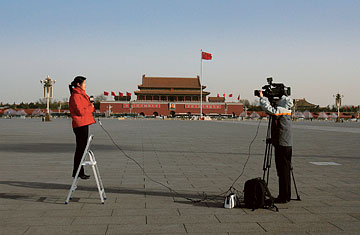
AND HERE IS THE NEWS: Many journalists do their best within difficult constraints
Two caricatures have defined the international view of Chinese journalists. The first is that of the Orwellian mouthpiece — the unquestioning apparatchik feeding the cowed masses their daily dose of newspeak. The second is that of the dissident author, imprisoned, beaten and tortured for railing against corruption and human-rights abuses, or forced into lonely exile and doomed forevermore to wander the Western lecture circuit.
There is some truth in both images. But the 20 Beijing-based journalists interviewed by University of Iowa journalism professor Judy Polumbaum in China Ink fall somewhere in the middle. Caught between a free market that rewards investigative reporting with increased readership and a fearful government that does its best to discourage whistle-blowing, these astute professionals — most lead their field as top editors, columnists or foreign correspondents — are forced to adopt new definitions of success. The values that they strive to maintain — avoiding bias, exposing wrongdoing and captivating an audience — will be recognized by journalists everywhere, however.
Censorship is always, of course, the elephant in the back corner of the Chinese newsroom. Certain topics, like Taiwan, Tibet and the Falun Gong, go conspicuously unmentioned. But grand controversies are not the focus of the book. China Ink instead tells the story of the everyday fight to sidestep propaganda and produce a serviceable publication or program. A famous radio host tells of how she convinced a murderer who confessed on air to turn himself in. A magazine writer tells of the story she penned — and of how bad she smelled — after taking a three-day train journey to southern China in a car full of hogs. One reporter explains how he persuaded local officials to help him with a story on rural prostitution, usually a taboo subject. Another faced a barrage of threatening phone calls and had to move home when she dared to document the demolition of a group of Beijing homes and described how residents who resisted were being beaten. Such journalism is far from controversial, but it is also not the kind of state-sanctioned drivel that many foreigners imagine Chinese media to be filled with. Even during the sensitive Olympics period, the press asserted itself where it could. There was no talk of human rights, but Chinese journalists reported on everything from Beijing's traffic woes to lip-synching in the opening ceremony, exposing imperfections that officials tried to conceal.
While many of Polumbaum's interviewees have worked or traveled abroad and have thus been able to compare different media sectors for themselves, there is no presumption that Chinese journalists have it worse. Censorship is everywhere, many say, pointing out that the activities of U.S. media in Iraq can be tightly restricted by the military. Others, writing for privately owned newspapers and magazines, say that prioritizing profit is just as destructive to journalism as a censor's pen — something that journalists complain about all the time, wherever they are. Tabloid journalists will be especially familiar with the pressure to inflate stories in order to trump the competition. Magazine reporter Li Yang puts it beautifully: "I told my editors that if you want me to pluck a star from the sky, there are two ways: Either I fall off a skyscraper trying or I draw you a picture of a star. Thus is fake news born."
Innumerable pundits have vied to pronounce upon the social and cultural development of the Chinese, but Polumbaum's approach — letting her subjects speak for themselves — appears to be the one now needed most. After putting her interviewees into context with a concise introduction, she simply lets each one recount their own story in a dedicated chapter, resisting the temptation to analyze and conclude, and eschewing clichés such as the prediction that the free market will break down censorship entirely. What results is an unadorned snapshot of a moment in Chinese media, both intimate and unusual.
